Unit 1 I go to school at 8:00 Lesson 3 课件
文档属性
| 名称 | Unit 1 I go to school at 8:00 Lesson 3 课件 |

|
|
| 格式 | zip | ||
| 文件大小 | 2.4MB | ||
| 资源类型 | 教案 | ||
| 版本资源 | 人教精通版(三年级起点) | ||
| 科目 | 英语 | ||
| 更新时间 | 2016-11-05 18:30:32 | ||
图片预览



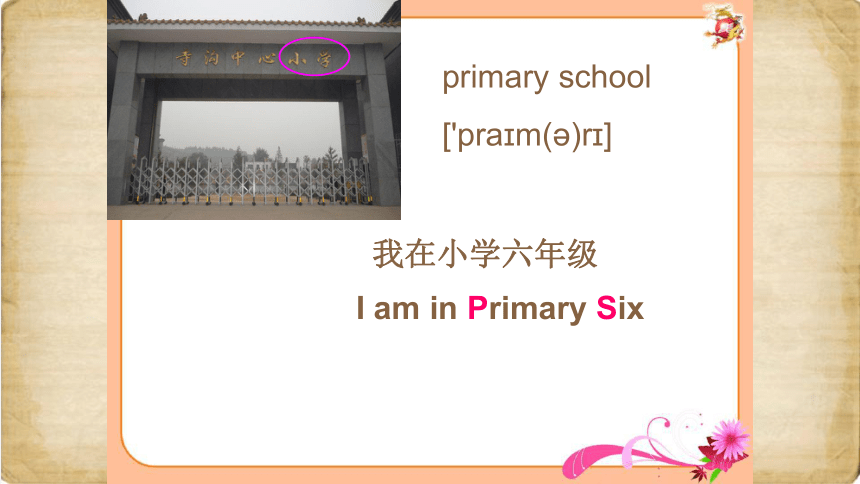
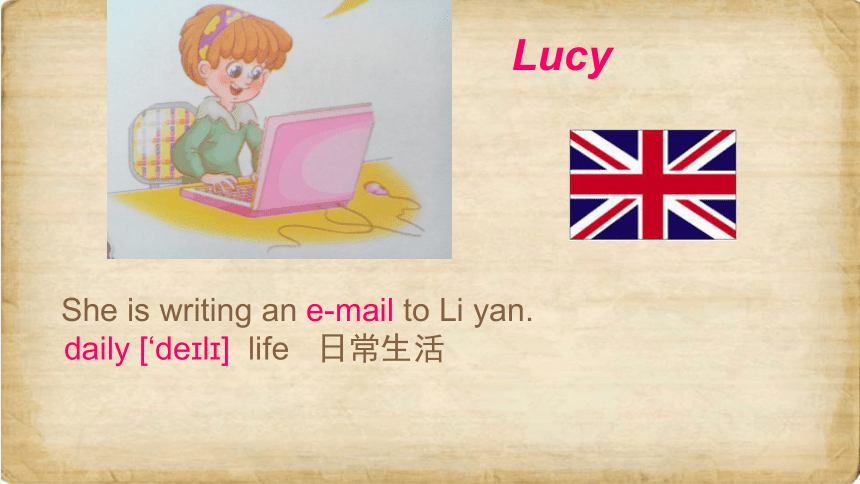
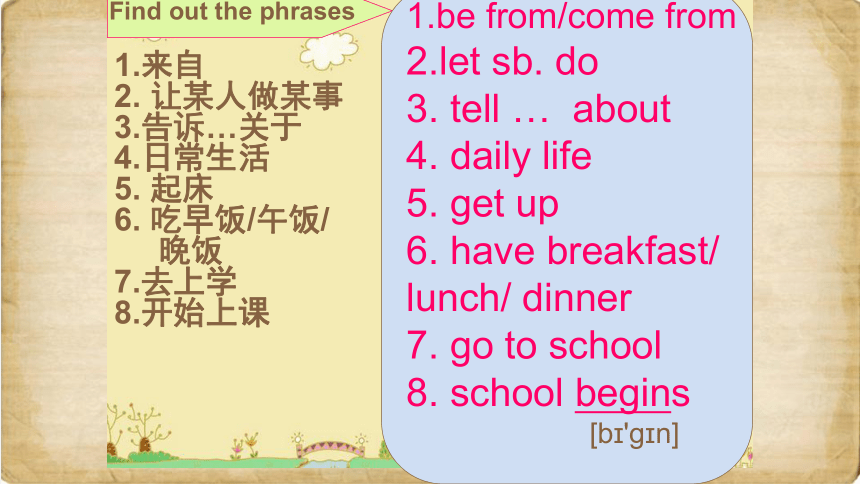
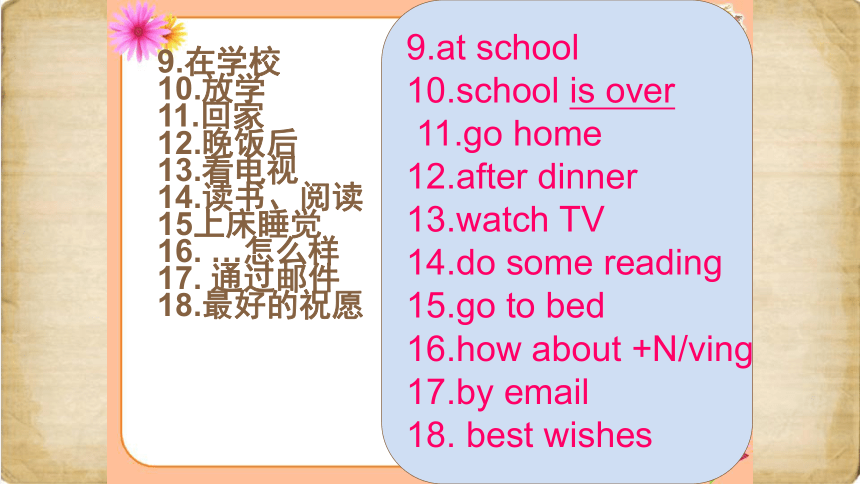
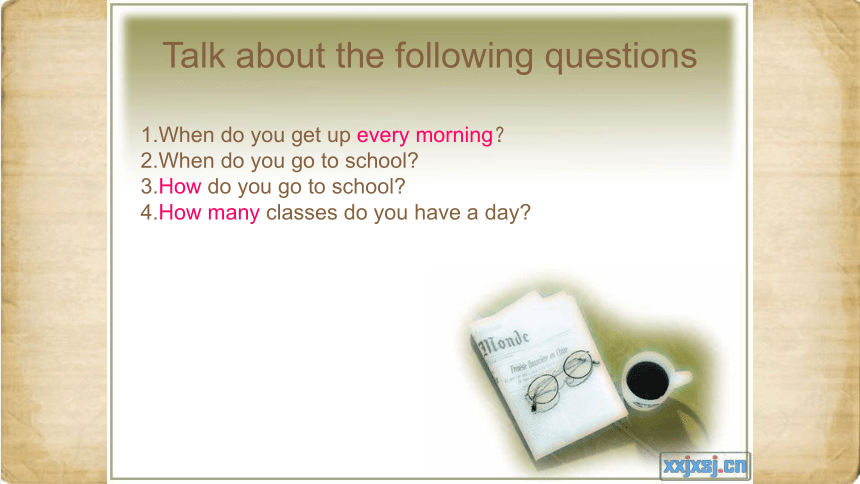
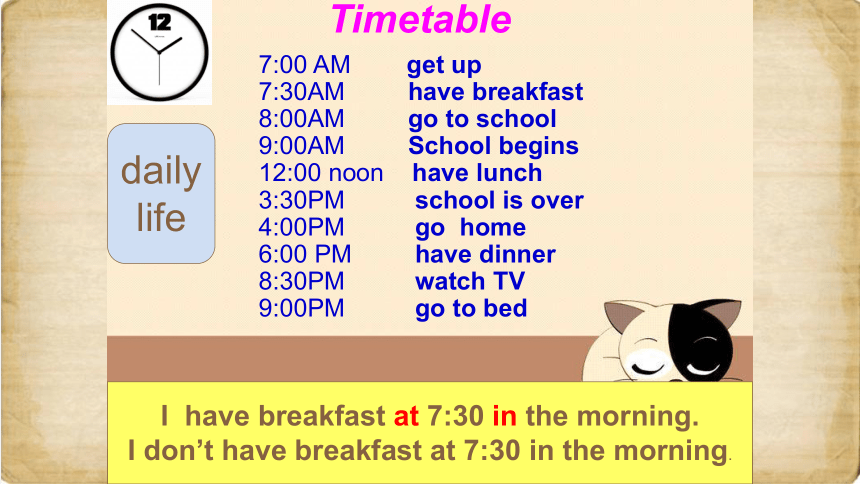
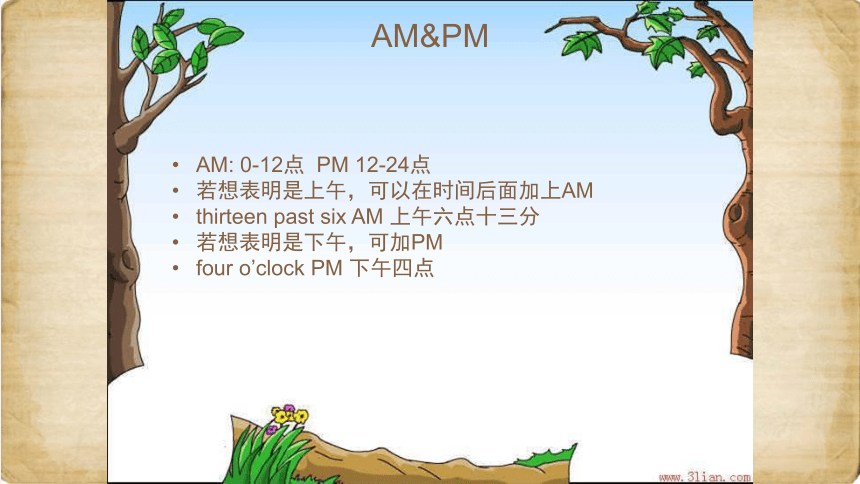
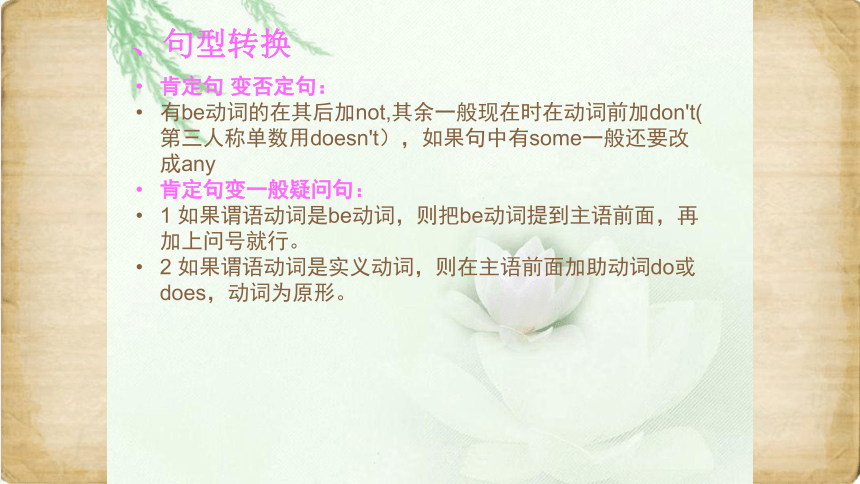
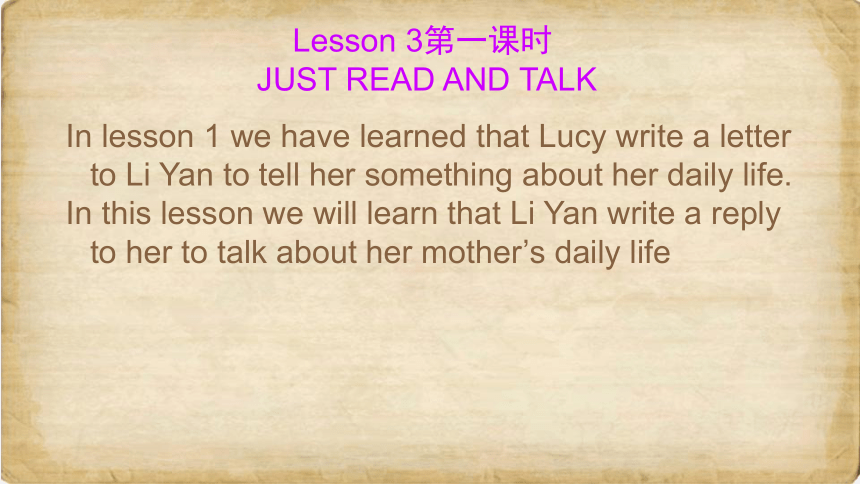
文档简介
课件48张PPT。Unit 1 I go to school at 8:00
Lesson 3lunch [l?nt?]?
午餐breakfast ['brekf?st]?早餐dinner ['d?n?]晚餐Subject [s?bd?ekt]学科ChinesemathsEnglishscience?['sa??ns] artmusicPEprimary school?
['pra?m(?)r?] 我在小学六年级
I am in Primary Six Lucy
She is writing an e-mail to Li yan.
daily?[‘de?l?] life 日常生活1.来自
2. 让某人做某事
3.告诉…关于
4.日常生活
5. 起床
6. 吃早饭/午饭/
晚饭
7.去上学
8.开始上课
Find out the phrases
1.be from/come from
2.let sb. do
3. tell … about
4. daily life
5. get up
6. have breakfast/
lunch/ dinner
7. go to school
8. school begins
[b?'g?n]
9.在学校
10.放学
11.回家
12.晚饭后
13.看电视
14.读书、阅读
15上床睡觉
16. …怎么样
17. 通过邮件
18.最好的祝愿
9.at school
10.school is over
11.go home
12.after dinner
13.watch TV
14.do some reading
15.go to bed
16.how about +N/ving
by email
best wishes
Talk about the following questions1.When do you get up every morning?
2.When do you go to school?
3.How do you go to school?
4.How many classes do you have a day?Timetable7:00 AM get up
7:30AM have breakfast
8:00AM go to school
9:00AM School begins
12:00 noon have lunch
3:30PM school is over
4:00PM go home
6:00 PM have dinner
8:30PM watch TV
9:00PM go to beddaily
lifeI have breakfast at 7:30 in the morning.
I don’t have breakfast at 7:30 in the morning.AM&PM AM: 0-12点 PM 12-24点
若想表明是上午,可以在时间后面加上AM
thirteen past six AM 上午六点十三分
若想表明是下午,可加PM
four o’clock PM 下午四点、句型转换肯定句 变否定句:
有be动词的在其后加not,其余一般现在时在动词前加don't(第三人称单数用doesn't),如果句中有some一般还要改成any
肯定句变一般疑问句:
1 如果谓语动词是be动词,则把be动词提到主语前面,再加上问号就行。
2 如果谓语动词是实义动词,则在主语前面加助动词do或does,动词为原形。Lesson 3第一课时 JUST READ AND TALKIn lesson 1 we have learned that Lucy write a letter to Li Yan to tell her something about her daily life.
In this lesson we will learn that Li Yan write a reply to her to talk about her mother’s daily lifeFirst, let’s try to remember the form of writing a letter.The format of an e-mail Dear XX,
………………………………………
……
………………………………………
…….
I’m looking forward to hearing from
you.
Best wishes,
XX
Try to divide the passage into some partsShe gets up at 6:00 in the morning.When does you mother get up?cook(s) breakfast做早餐every morning每天早晨6:30When does your mother cook breakfast?He does homework at 5:00 every afternoonevery afternoon每个下午take a walk散步She reads stories to me every evening.every evening每个晚上 teach English教英语I’m very happy to get your email. I’m from Beijing, China. I’m in Grade Six. My mother is an English teacher. Every morning, she gets up at 6:00. Then she cooks breakfast. She goes to school at7:00. She has four lessons a day.
Her students often lean English by singing, chanting and playing games. They like her lessons very much..
Group work: 小组活动 Read the first part with your group members,and then pick out a representative to read it to us和你的组员一起读课文,然后每组选一个代表向大家展示The third part: summary总结 She goes home at about 5:30 in the afternoon, and then she cooks dinner. After dinner she often takes a walk with my father. She reads English stories to me.
I love my mother and father very much! Please tell me about your parents, Lucy.?
????????1.可数名词前冠词用a an, 元音因素开头单词前用an
2.烹调、做早餐cook breakfast, lunch,dinner,supper
3.她每天有四节课has表示有,have breakfast表示吃
我们每天上八节课We have eight classes a day.
4.Learn sth. By doing 通过…学习…
Eg. We learn music by singing and dancing.
5.Take a walk with sb.和某人散步Let’s play and practice
句子转换游戏
A: my mother gets up at 6:00 in the moring.
B:Her mother gets up at 6:00, my mother gets up at 6:30.
C: Her mother gets up at 6:00,his mother gets up at 6:30,and my mother gets up at 7:00.
重读 Now, let’s go over the passage together 否定句 the negative form of a simple present sentenceShe gets up at 6 in the morning.
She doesn’t get up at 6:30 in the morning.She doesn’t cook breakfast at sixShe doesn’t teach English at 8:00She doesn’t take a walk at 6:00
She doesn’t read stories at 7:00Play当演奏乐器讲时中间加定冠词 “the”Play the drums敲鼓Play 当打某种球类时,中间不加任何冠词Play basketball打篮球Review吃早餐
have breakfast
吃午餐
have lunch
吃晚餐
have dinner
起床
get up
看电视
watch TV
上床睡觉
go to bed Hello everyone,
My name is Nancy. I’m from China. I’m thirty. Let me tell you something about my daily life.
I get up at six every morning. I go to school at twenty to eight. School begins at ten past eight. I have classes from 8:10 to 11:40. I bring a lunch box to school.
School ends at half past four. I get home at about five PM. Then I read books and newspapers. I have dinner at about seven. After dinner, I watch TV. I go to bed at 9:00.
How about you? Please tell me.
Homework 仿写作文参考语句:What’s her/his name?
When does he/she…?
Dose he/she often…?
参考词汇:
She/he/my/mother/father/sister
brother
get up/cook breakfast/take a walk/
read stories/watch TV/go home/go to bed…
at…
every morning/afternoon/evening
Introduce your family参考词汇:
She/he/my/mother/father/sister
brother
get up/cook breakfast/take a walk/
read stories/watch TV/go home/go to bed…
at…
every morning/afternoon/evening一般现在时※定义:一般现在时表示现在的、经常的、习惯性的动作或状态
形式:肯定句主语+动词原形动词三单+宾语
否定句主语+don’tdoesn’t+动作动词原+其它
疑问句DoDoes +主语+动作动词原型+其它
一般现在时的标识
频率副词: always, usually, often,sometimes,never
I usually go to school at 7.
He is always late for school.
位置:be 动词后,实意动词之前
Lesson 3lunch [l?nt?]?
午餐breakfast ['brekf?st]?早餐dinner ['d?n?]晚餐Subject [s?bd?ekt]学科ChinesemathsEnglishscience?['sa??ns] artmusicPEprimary school?
['pra?m(?)r?] 我在小学六年级
I am in Primary Six Lucy
She is writing an e-mail to Li yan.
daily?[‘de?l?] life 日常生活1.来自
2. 让某人做某事
3.告诉…关于
4.日常生活
5. 起床
6. 吃早饭/午饭/
晚饭
7.去上学
8.开始上课
Find out the phrases
1.be from/come from
2.let sb. do
3. tell … about
4. daily life
5. get up
6. have breakfast/
lunch/ dinner
7. go to school
8. school begins
[b?'g?n]
9.在学校
10.放学
11.回家
12.晚饭后
13.看电视
14.读书、阅读
15上床睡觉
16. …怎么样
17. 通过邮件
18.最好的祝愿
9.at school
10.school is over
11.go home
12.after dinner
13.watch TV
14.do some reading
15.go to bed
16.how about +N/ving
by email
best wishes
Talk about the following questions1.When do you get up every morning?
2.When do you go to school?
3.How do you go to school?
4.How many classes do you have a day?Timetable7:00 AM get up
7:30AM have breakfast
8:00AM go to school
9:00AM School begins
12:00 noon have lunch
3:30PM school is over
4:00PM go home
6:00 PM have dinner
8:30PM watch TV
9:00PM go to beddaily
lifeI have breakfast at 7:30 in the morning.
I don’t have breakfast at 7:30 in the morning.AM&PM AM: 0-12点 PM 12-24点
若想表明是上午,可以在时间后面加上AM
thirteen past six AM 上午六点十三分
若想表明是下午,可加PM
four o’clock PM 下午四点、句型转换肯定句 变否定句:
有be动词的在其后加not,其余一般现在时在动词前加don't(第三人称单数用doesn't),如果句中有some一般还要改成any
肯定句变一般疑问句:
1 如果谓语动词是be动词,则把be动词提到主语前面,再加上问号就行。
2 如果谓语动词是实义动词,则在主语前面加助动词do或does,动词为原形。Lesson 3第一课时 JUST READ AND TALKIn lesson 1 we have learned that Lucy write a letter to Li Yan to tell her something about her daily life.
In this lesson we will learn that Li Yan write a reply to her to talk about her mother’s daily lifeFirst, let’s try to remember the form of writing a letter.The format of an e-mail Dear XX,
………………………………………
……
………………………………………
…….
I’m looking forward to hearing from
you.
Best wishes,
XX
Try to divide the passage into some partsShe gets up at 6:00 in the morning.When does you mother get up?cook(s) breakfast做早餐every morning每天早晨6:30When does your mother cook breakfast?He does homework at 5:00 every afternoonevery afternoon每个下午take a walk散步She reads stories to me every evening.every evening每个晚上 teach English教英语I’m very happy to get your email. I’m from Beijing, China. I’m in Grade Six. My mother is an English teacher. Every morning, she gets up at 6:00. Then she cooks breakfast. She goes to school at7:00. She has four lessons a day.
Her students often lean English by singing, chanting and playing games. They like her lessons very much..
Group work: 小组活动 Read the first part with your group members,and then pick out a representative to read it to us和你的组员一起读课文,然后每组选一个代表向大家展示The third part: summary总结 She goes home at about 5:30 in the afternoon, and then she cooks dinner. After dinner she often takes a walk with my father. She reads English stories to me.
I love my mother and father very much! Please tell me about your parents, Lucy.?
????????1.可数名词前冠词用a an, 元音因素开头单词前用an
2.烹调、做早餐cook breakfast, lunch,dinner,supper
3.她每天有四节课has表示有,have breakfast表示吃
我们每天上八节课We have eight classes a day.
4.Learn sth. By doing 通过…学习…
Eg. We learn music by singing and dancing.
5.Take a walk with sb.和某人散步Let’s play and practice
句子转换游戏
A: my mother gets up at 6:00 in the moring.
B:Her mother gets up at 6:00, my mother gets up at 6:30.
C: Her mother gets up at 6:00,his mother gets up at 6:30,and my mother gets up at 7:00.
重读 Now, let’s go over the passage together 否定句 the negative form of a simple present sentenceShe gets up at 6 in the morning.
She doesn’t get up at 6:30 in the morning.She doesn’t cook breakfast at sixShe doesn’t teach English at 8:00She doesn’t take a walk at 6:00
She doesn’t read stories at 7:00Play当演奏乐器讲时中间加定冠词 “the”Play the drums敲鼓Play 当打某种球类时,中间不加任何冠词Play basketball打篮球Review吃早餐
have breakfast
吃午餐
have lunch
吃晚餐
have dinner
起床
get up
看电视
watch TV
上床睡觉
go to bed Hello everyone,
My name is Nancy. I’m from China. I’m thirty. Let me tell you something about my daily life.
I get up at six every morning. I go to school at twenty to eight. School begins at ten past eight. I have classes from 8:10 to 11:40. I bring a lunch box to school.
School ends at half past four. I get home at about five PM. Then I read books and newspapers. I have dinner at about seven. After dinner, I watch TV. I go to bed at 9:00.
How about you? Please tell me.
Homework 仿写作文参考语句:What’s her/his name?
When does he/she…?
Dose he/she often…?
参考词汇:
She/he/my/mother/father/sister
brother
get up/cook breakfast/take a walk/
read stories/watch TV/go home/go to bed…
at…
every morning/afternoon/evening
Introduce your family参考词汇:
She/he/my/mother/father/sister
brother
get up/cook breakfast/take a walk/
read stories/watch TV/go home/go to bed…
at…
every morning/afternoon/evening一般现在时※定义:一般现在时表示现在的、经常的、习惯性的动作或状态
形式:肯定句主语+动词原形动词三单+宾语
否定句主语+don’tdoesn’t+动作动词原+其它
疑问句DoDoes +主语+动作动词原型+其它
一般现在时的标识
频率副词: always, usually, often,sometimes,never
I usually go to school at 7.
He is always late for school.
位置:be 动词后,实意动词之前
同课章节目录
- Unit 1 I go to school at 8:00.
- Lesson 1
- Lesson 2
- Lesson 3
- Lesson 4
- Lesson 5
- Lesson 6
- Unit 2 What's your hobby?
- Lesson 7
- Lesson 8
- Lesson 9
- Lesson 10
- Lesson 11
- Lesson 12
- Unit 3 Would you like to come to my birthday party
- Lesson 13
- Lesson 14
- Lesson 15
- Lesson 16
- Lesson 17
- Lesson 18
- Fun Time 1
- Recycle 1
- Recycle 2
- Fun Reading
- Unit 4 January is the first month.
- Lesson 19
- Lesson 20
- Lesson 21
- Lesson 22
- Lesson 23
- Lesson 24
- Unit 5 July is the seventh month.
- Lesson 25
- Lesson 26
- Lesson 27
- Lesson 28
- Lesson 29
- Lesson 30
- Unit 6 There are four seasons in a year.
- Lesson 31
- Lesson 32
- Lesson 33
- Lesson 34
- Lesson 35
- Lesson 36
- Fun Time 2
- Recycle 1
- Recycle 2
- Fun Reading
